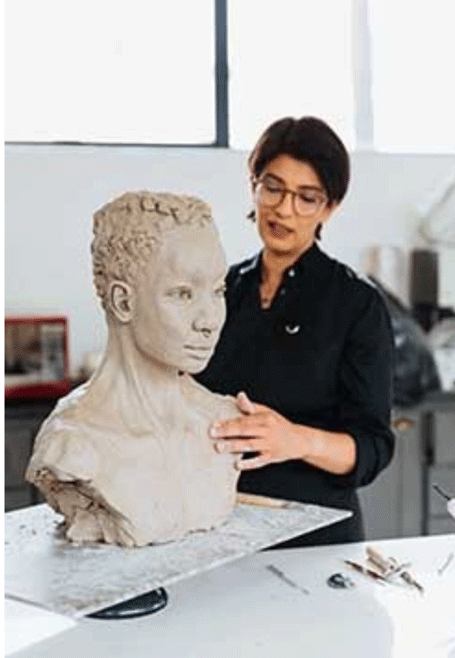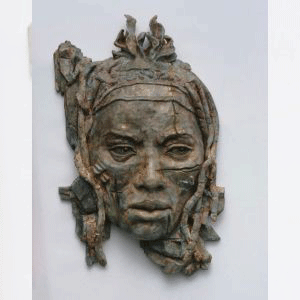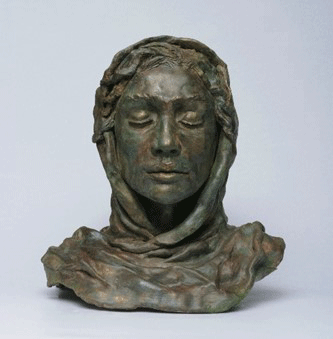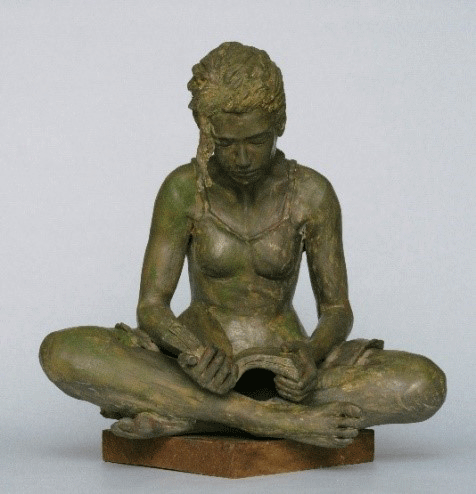On the heels of International Woman’s Day which occurred on March 8th, is Ramadan, the holiest month in the Muslim calendar. The former is a day that is reserved to celebrate women who are making an impact through their work, services or actions. The latter is a month whereby Muslims from across the world partake in fasting, prayer, reflection and community. By and large, Ramadan is a period of introspection and communal prayer.
Women are far too incredible to only be celebrated for one day in a year. Women should be celebrated all year long. Fathema Bemath, a Muslim artist who is also a mother, entrepreneur and a sculptor, is dismantling the narrow visual representation of femininity. She is breaking moulds with her magnificent, breathtaking and absolutely gorgeous sculptures which highlight the strong female forms in all its glorious ways.

Bemath, who owns and manages a prosperous dental laboratory, has recently followed her passion of becoming an artist. As a result of her strict background, it took her a long time to fulfil her dreams. When the world stopped due to the pandemic, Bemath took advantage of this period to embrace her passion. She had the time to reflect on her life’s journey and on the path that could most fulfil her whilst also making a mark in the world. Art was the natural choice. This was her first love when she was growing up and sculpting felt so natural and so deliriously fulfilling, just like a sip of water after roaming the desert for an elongated period. Life is a tapestry; things may take some time to come together, but when everything falls into place it becomes a beautiful masterpiece.
Bemath illustrates that when you take the leap to embrace your dreams and work hard at honing them, things have a way of falling into place. She grew up during a time when traditional careers were her only option; working in the art space was not only frowned upon but was seen as a career that could not offer stability. This notion has been dismantled in recent times. With the invention of social media as well as increased exposure, people are able to successfully live off of their artworks. Be that as it may, due to her circumstances, she took the long road home; but victory tastes sweeter when you are wiser to appreciate the fruits of your love and labour.

During her studies and in her career, she was often the only brown woman in white spaces. Like so many people in her shoes, she felt overtly or covertly expected to prove her worth in being in those spaces. When you are the only marginalized person in white spaces, there is a sense that you have to constantly work harder than everyone in order to validate your worthiness. Furthermore, you are expected to always be grateful or to excel above what is expected from those who belong to the “default” social group. You serve as a representation for all members of your social groups and your failure is not just an onus on yourself, but a failure of everyone in your social group. Fathema knows this all too well. Perfection and excellence is something that has always been expected from her, and she achieves this in all facets of her life, even in her art. Perfection is a double edge sword, but as Shakespeare stated “heavy is the head that wears the crown.”
In the art world, women are often depicted by men and are sculpted or painted from the perspective or for the enjoyment of a male gaze. Women have served as muses to male artists for a long time and with this comes the hypersexualization of women as well as their objectification. Women are reduced to being sexual creatures meant to satisfy men. With her sculptures, Fathema hopes to take this notion and flip it upside down. Women are indeed beautiful creatures whose beauty should be displayed for the public consumption, but it is the context in which they are depicted that she finds problematic.

In her art pieces, she tackles the often contentious concept of femininity, which in the art space is often depicted in the image of a white woman. “Black and brown women have been stripped away of their femininity, they are depicted as working mules and we need to dismantle the notion of the ‘strong Black woman’,” Bemath stated in an interview with Arts Help. When one looks at the statues of white women, which were created by the likes of Michelangelo, Picasso or Sandro Botticelli, the sculptor of The Birth of Venus, they all depict white women as the epitome of femininity.
Through her objective of redefining the image of Black and brown women, Bemath creates art that focuses on the United Nations Sustainable Development Goal for Gender Equality. White women have always been treated as the golden standard of beauty, femininity and wholesomeness, and every other woman who does not belong to that social group represents the antithesis of this vision. Such images have detrimental repercussions and trickle down to every facet of society.
A study by Harvard University found that “Black women are three to four times more likely to die from pregnancy-related complications than white women.” Additionally, “India’s skin whitening market is expected to achieve an annual market revenue of $720 million by 2023,” Bright Magazine reported. It is easy for people who do not understand the pressures of fitting in, to miss the lengths that the “other” has to go through to measure up. Even in the 21st century, the old racist adage still applies, “If you’re white, you’re alright.”

Bemath’s work is important and should not be dismissed as frivolous. In a world whereby “whiteness is imposed, presumed, venerated, and forced on Black women's bodies,” and where Black and brown people are killing themselves in the hopes of fitting into the narrow and exclusive standard of beauty, we need a woman from a marginalized social group to speak on those issues and challenge them.
Beauty may be deemed to be in the eyes of the beholder, but in a world whereby the beauty standard is biased, and only fits the white mould such as Barbie – or if they are Black, when their features are Eurocentric –, we need artists who are bold enough to challenge the distorted image of beauty.
